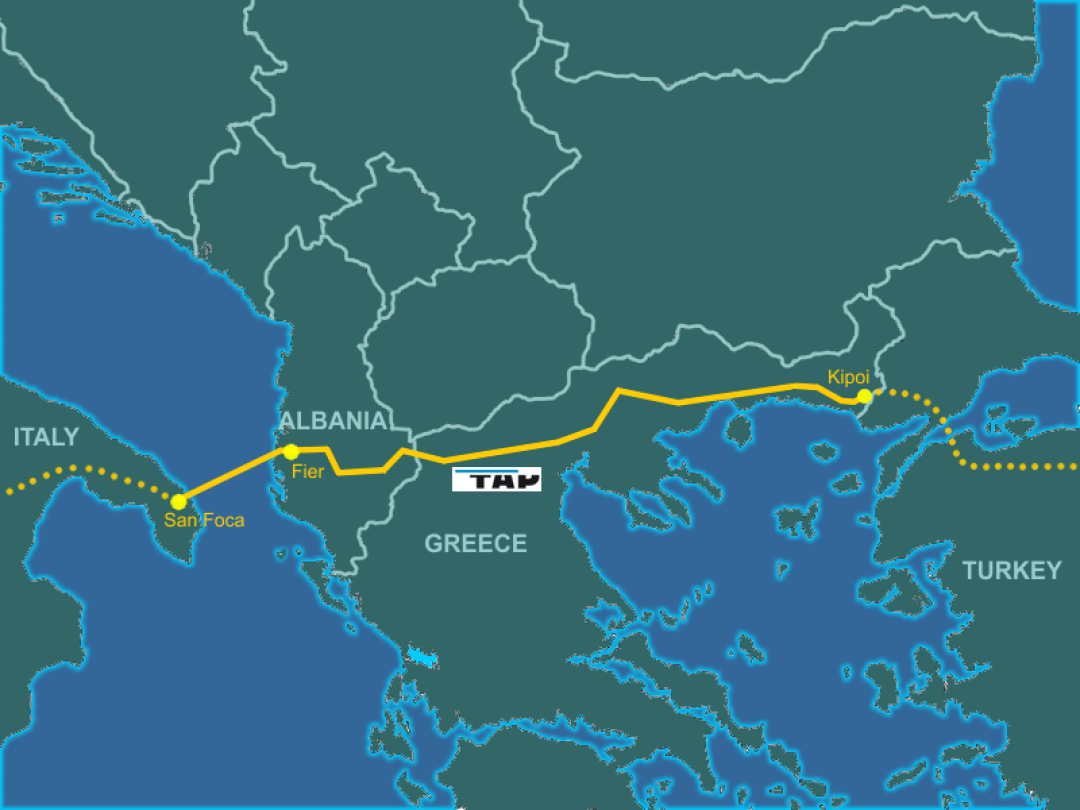
The Greek-Bulgarian interconnector has joined the TAP pipeline

The Greek-Bulgarian Interconnector Greece-Bulgaria (IGB) has joined the Trans-Adriatic Pipeline (TAP), which will transport natural gas from Azerbaijan to Bulgaria.
"Once the IGB is launched, this connection will initially supply Bulgaria with 1 billion cubic meters of gas per year, and in the next stage this volume will increase to 3 billion cubic meters, which corresponds to the current capacity of the interconnector," the operator said.
The commercial start of the interconnector will take place in July 2022, which will allow Bulgaria not only to buy Azerbaijani gas, but also to transport it through Greek LNG terminals, which will eliminate Russia's monopoly on the country's gas market.
"The IGB project is important for Bulgaria and the Southeast European region to increase supply security and diversify natural gas sources. At the regional level, IGB will provide access to the gas pipeline network for Bulgarian municipalities and regions that do not yet have access. The interconnector with Greece is a completely new route for the transportation of natural gas to Europe, which will allow Bulgaria and the region to receive supplies from new sources. The project will connect our country with the Southern Gas Corridor and has excellent synergy with major energy projects such as TAP, TANAP, EastMed and the LNG terminal in Alexandroupoli,” said Theodora Georgieva, ICGB Executive Director for Bulgaria.
The head of the Oil Research Center, Ilham Shaban, said that Bulgaria will soon be able to increase gas imports from Azerbaijan up to three times compared to last year.
"This will initially reduce Bulgaria's gas dependence on Russia to 35%," he said. Official Sofia has already applied to the State Oil Company of Azerbaijan (SOCAR) to purchase additional volumes of gas from Azerbaijan,” the expert said.
At the same time, the second phase of the project has been proposed, which will increase the capacity of the pipeline to 5 billion cubic meters per year.
IGB envisages the transportation of natural gas to Bulgaria produced in the second phase of the Shah Deniz gas condensate field in the Azerbaijani sector of the Caspian Sea. A total of 150 kilometres of the 182-kilometer pipeline pass through Bulgaria. The annual capacity of the pipeline is 3-5 billion cubic meters.
Earlier, Bulgaria’s largest natural gas distribution company Bulgargaz faced harsh criticism after it became known that the terms of the contract for gas supplies from Azerbaijan to Bulgaria was disclosed.
It is important to note that in January, both the government and experts attacked the corporation. Bulgarian opposition however, blamed authorities: it was the apparently new administration, which assumed office on December 14, 2021, that released Bulgargaz-AGSC (Azerbaijan Gas Supply Company) agreement provisions.
It's worth noting that a breach of the agreement's trade secrets inked in 2013 might had significant consequences for Bulgaria. Bulgargaz would have risked substantial financial consequences if the Azerbaijani side used its right to terminate the deal. The Bulgarian firm even requested that the State Agency for National Security uncover the source of the leak.
Nikolay Pavlov, the head of Bulgargaz, believed it is yet feasible to persuade Azerbaijan to continue delivering gas to Bulgaria.
"This is intolerable… This is the first time something like this has occurred," Pavlov grumbled. "No one has dared to invoke contract provisions to seek papers in the previous ten years." The information was spread in two ways, according to him: through the Bulgarian Gas Association and bloggers.
Nikolay Pavlov responded to the allegations, saying, "it is not true that our firm declined to acquire the entire quantity of Azerbaijani gas… Once the IGB pipeline is operational, we will receive the whole amount."
Meanwhile, starting January 1, the price of natural gas in Bulgaria increased by 30% for customers. Bulgargaz made no connection between the rise and difficulties with the Azerbaijani supplier.
"Even if Bulgargaz receives the total amount of Azerbaijani gas agreed upon, it would barely meet a fifth of the country's gas consumption during the winter months," the company claimed.
See Also


Mirzoyan Meets US Deputy Assistant Secretary Joshua Huck

Azerbaijani President Holds Talks with UAE and German Business Delegations on Economic Cooperation

Grigoryan Confirms Armenia’s Readiness to Dissolve OSCE Minsk Group Upon Peace Treaty Signing

Azerbaijani Official Warns of Ecological Risks to Caspian Sea, Similar to Lake Urmia and Aral Sea

